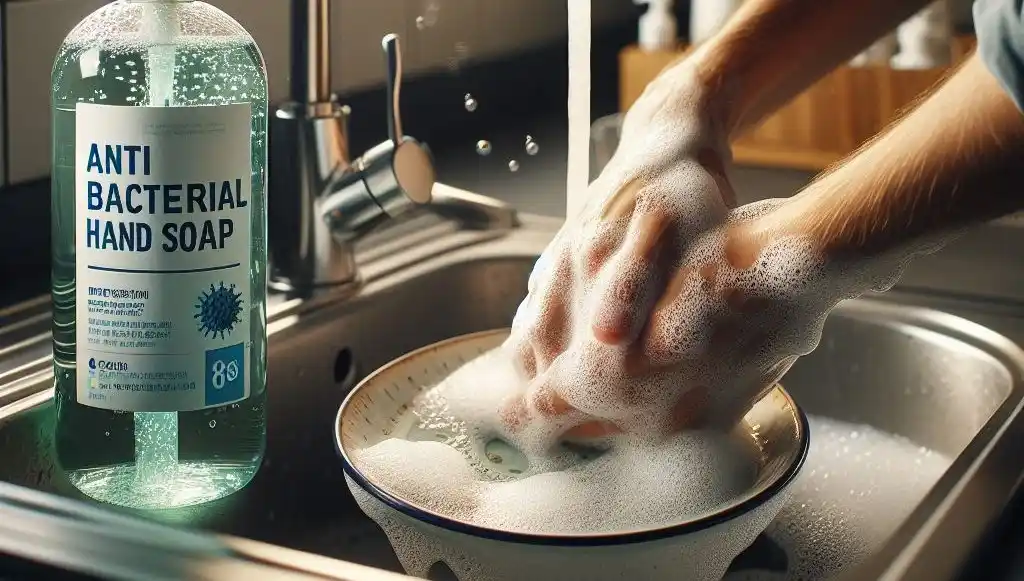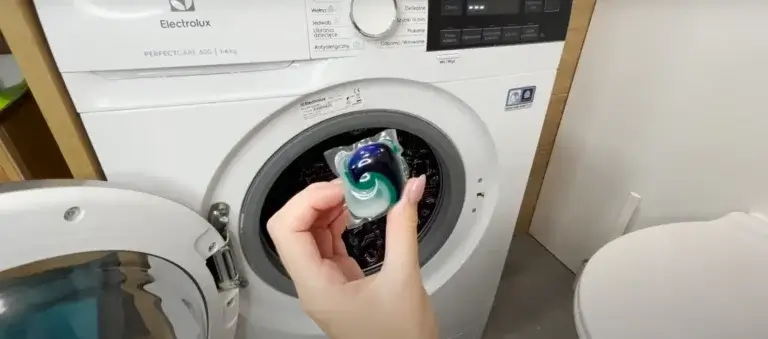Can You Wash Dishes With Antibacterial Hand Soap?
Have you ever found yourself staring hopelessly at a pile of dirty dishes, only to realize you’ve run out of dish soap? We’ve all been there. And when necessity strikes, many of us wonder — can you wash dishes with antibacterial hand soap instead?
While using hand soap to wash dishes in a pinch may seem harmless, experts advise against this cleaning shortcut. Hand soap contains antibacterial agents and other ingredients not suitable or safe for cleaning dishes and utensils used for food.
In this comprehensive guide, we’ll cover Can You Wash Dishes With Antibacterial Hand Soap and explore whether you should use antibacterial hand soap to wash dishes, the pros and cons, and better alternative solutions when you’re out of dish detergent.
Table of Contents
Should You Wash Dishes With Antibacterial Hand Soap?
The short answer is no—hand soap should not be routinely used as a dish soap substitute for cleaning dishes.
While hand soap will create suds and bubbles and may technically clean your dishes, there are a few major downsides:
- Hand soaps often contain antibacterial agents like triclosin which are meant for use on skin and not safe for long-term oral consumption residues left from washing.
- Hand soap lacks the grease-cutting ingredients needed to remove baked, oily, or greasy food residues and stains on plates and pans.
- Fragrance and skin moisturizers in hand soaps can leave behind food-safe residues.
- Hand soap may not fully sanitize dishes from harmful bacteria and germs. Proper dish soaps contain disinfectants safe for food surfaces.
While using hand soap in a pinch may get your dishes reasonably clean looking, experts caution against using antibacterial hand soaps for routine dishwashing. Repeated exposure to soap residues risks adverse health effects.
We’ll explore the ingredients and risks in more detail later on. But first, when is it safe to use hand soap for washing dishes?
When Is It Safe to Wash Dishes With Hand Soap?
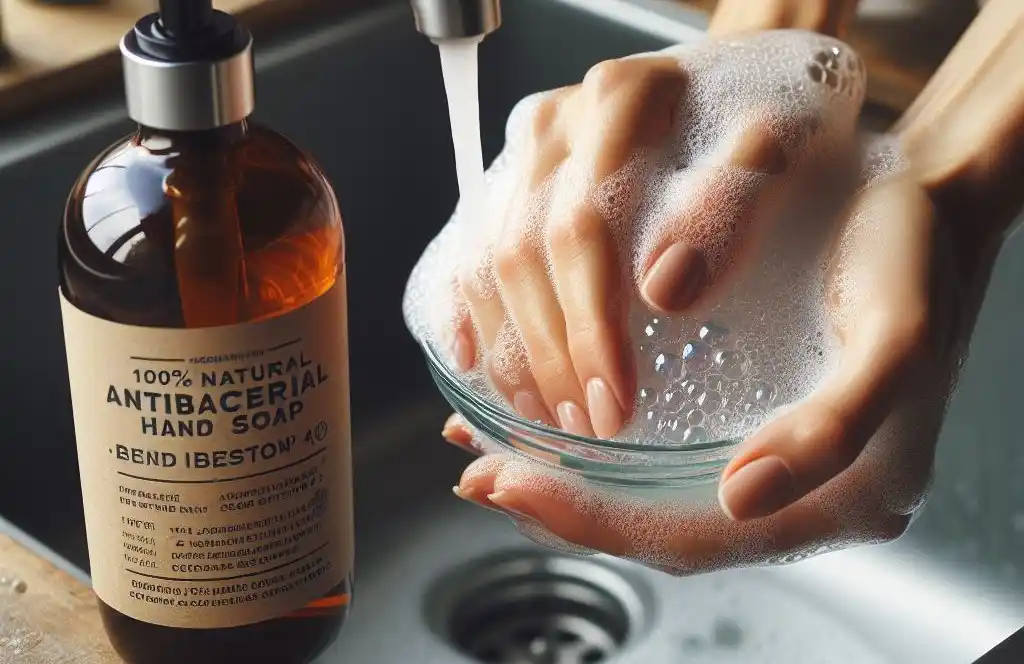
Unless it’s explicitly marketed as a dish detergent, hand soap should generally be avoided for washing dishes, pots, pans, and other cooking utensils that come into contact with food.
However, in an emergency when your dish detergent supply runs out, using hand soap 1-2 times won’t necessarily harm you, according to some experts.
The Apartment Therapy suggests for occasional use, liquid hand soap is gentler than degreasing dish detergent. So you may only want to spot clean tricky grease areas with dish soap to avoid overdrying your skin.
Similarly, Don’t Waste Your Money agrees very sporadic use of hand soap for dishes probably won’t kill you. But regularly relying on hand soap leaves behind bacteria and soap scum that becomes unsafe over time.
When relying on hand soap for dishwashing, be extra diligent about fully rinsing dishes and air drying completely to remove any soap residues. You may also want to rinse dishes with a diluted vinegar solution as an extra precaution against leftover soap or germs.
Ideally, only use hand soap for occasional emergency dish cleaning—not daily usage. Even then, stick to fragrance-free liquid hand soaps to minimize the chances of unsafe residue or accidental ingestion of antibacterial additives like triclosin.
For routine dishwashing, stick to actual dish soaps without these potentially problematic ingredients.
Dish Soap vs Hand Soap Ingredients
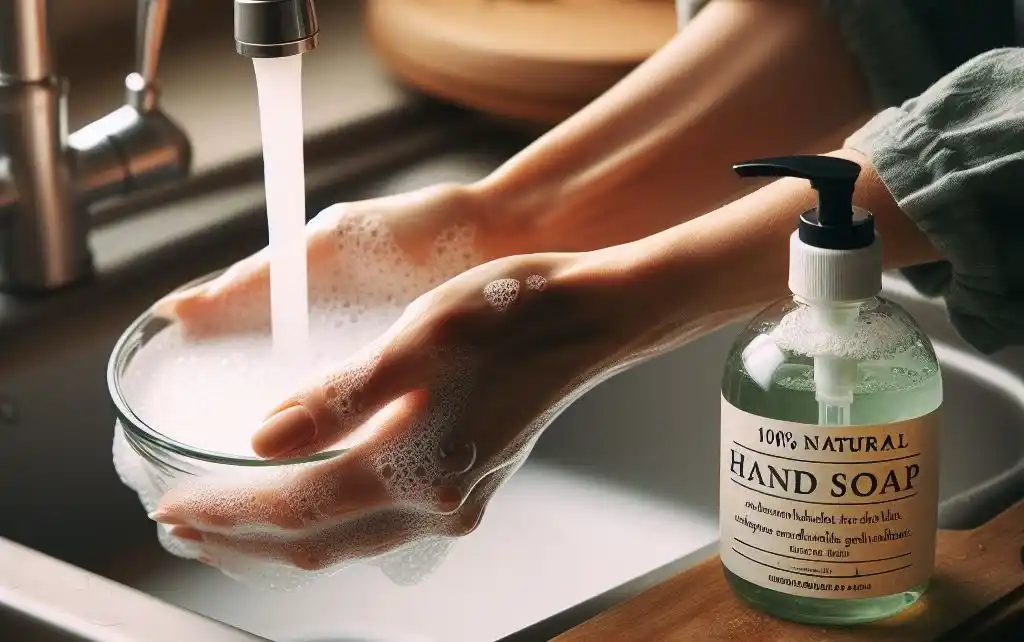
Dish soap and hand soap perform different cleaning jobs. So you shouldn’t expect them to have the same germ-busting superpowers.
Key Dish Soap Ingredients
Typical dish detergents like Dawn, Palmolive, Gain, and Ajax contain specialized degreasing and sanitizing agents tailored for food surfaces:
- Grease-cutting surfactants – Remove stuck-on oil and greasy food residue
- Rinsing agents – Prevent spots and film to leave glassware sparkling
- Antibacterial ingredients – Kill harmful bacteria like salmonella or E. coli breeds that can grow in food stuck to dishes
- Deodorizers – Leave dishes smelling fresh with lemon, floral, or unscented formulas
- Water softeners – Prevent soap scummy buildup in hard water areas
Many standard dish soaps also boast antibacterial and antifungal properties from active ingredients like:
- Bleach
- Hydrogen peroxide
- Thymol
- Zinc pyrithione
- Sodium hypochlorite
These powerful disinfectants kill 99.9% of bacteria on contact when washing dishes as the label promises.
Key Hand Soap Ingredients
Hand soaps focus more on antibacterial cleansing plus skin moisturizing. Common ingredients include:
- Triclosan – Controversial antibacterial and antifungal agent linked to antibiotic resistance and possible endocrine disruption with repeated exposure. Already banned from consumer soaps in the EU and Canada.
- Parabens – Antibacterial preservatives are also used in cosmetics and skincare. Small exposure levels are considered safe by most health agencies. But paraben buildup may have unproven estrogenic effects.
- Fragrances – Many liquid hand soaps contain synthetic perfumes and essential oils that leave hands smelling fresh. Not safe or suitable for food surfaces.
- Moisturizers – Ingredients like glycerin or vitamin E to keep skin smooth and conditioned after repeated hand washing. Another reason is not ideal for dishes.
As you can see, hand soap contains ingredients tailored for skin rather than eating surfaces. Triclosan for example remains a controversial antibacterial agent the FDA believes has more risks than benefits in prolonged use or accumulation in the body.
While occasional hand soap use on dishes likely won’t cause immediate harm, repeated exposure could lead to a buildup of triclosan or parabens the FDA considers unsafe in the long run.
For routine cleaning, experts overwhelmingly recommend sticking to regular dish soap without these worrisome antibacterial ingredients found in hand soap products.
Are Antibacterial Hand Soaps More Effective for Dishes?
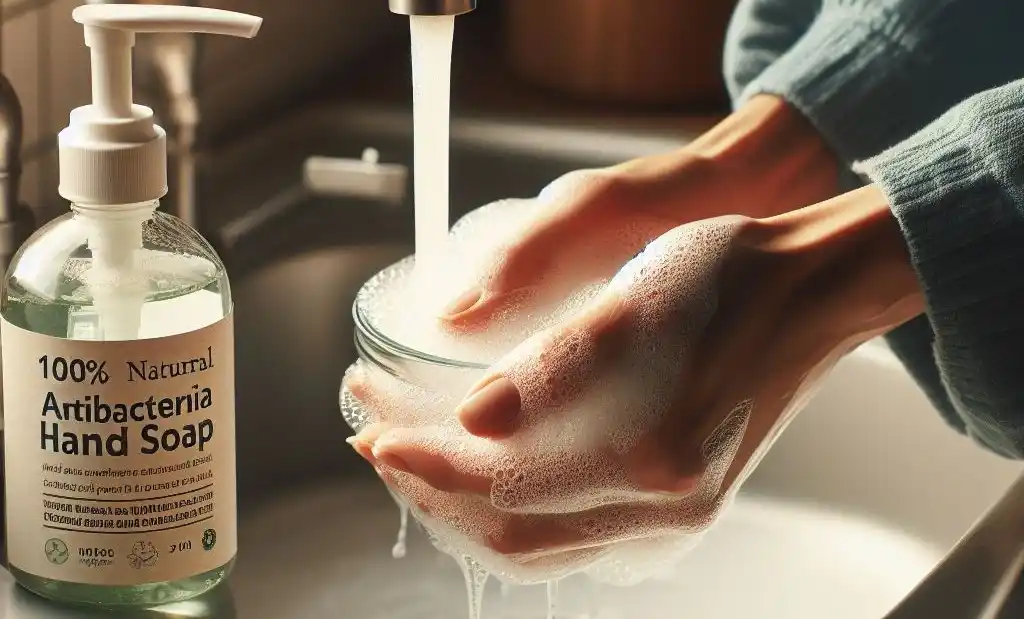
Antibacterial hand soaps often contain triclosan or parabens added specifically for bacteria-fighting power against germs and illness-causing microbes.
However, these same antibacterial ingredients aren’t meant for food surfaces and lack sudsing agents to cut through grease or oils.
Essentially, antibacterial hand soaps are specially formulated to kill microbes found on the skin that make people sick. Standard dish detergents instead use bleach, peroxide, or plant extracts proven safe and effective against the types of bacteria thriving in food stuck to eating surfaces.
So if you’re hoping to eliminate germs or sanitize dishes, stick to regular dish soap without triclosin or other problematic chemicals found in antibacterial hand washes. These heavy-duty cleaning agents give better protection against foodborne illnesses you want to destroy.
What About Other Hand and Body Soaps?
We’ve focused specifically on why standard antibacterial hand soap makes a poor dish detergent substitute. But about other liquid hand washes or bar soaps you may have to lie around?
Here’s a quick guide on what’s safe in a pinch or occasional use:
- Liquid hand soap – Gentler than dish detergent in limited use. Choose a fragrance-free formula.
- Bar soap – Usually too drying for dishes long term. Choose a gentle plant-based formula.
- Body wash – Nearly as harsh as dish soap. Should be okay very occasionally.
- Laundry detergent – Formulated for clothes washing only. Never for dishes!
Overall, while none are quite as tough on grease as dish detergent, any gentle hand or body soap should work reasonably well for occasional emergency dishwashing.
Just take extra care to rinse thoroughly after washing dishes to remove any soap residue or fragrance. Let dishes completely air dry instead of towel drying to prevent contamination.
For routine cleaning, liquid hand soap remains the safest bet over the frequent use of bar soap, body wash, shampoo, or laundry detergents. Ultimately, dish detergent formulated specifically for food surfaces gives the best results and bacteria removal.
Proper Way to Hand Wash Dishes
Whether you use regular dish soap or emergency hand soap solution, proper technique still matters for clean, germ-free dishes. Here’s a quick best practice guide:
- Scrape and rinse – Use a spatula, brush, or paper towel to wipe away leftover food bits and grease before washing. Give dishes a quick hot water rinse to flush away debris.
- Wash in hot sudsy water – Fill one sink or basin with hot water and a few squirts of soap (dish detergent or hand soap). Let the dishes soak for a few minutes to loosen residue. Then scrub plates, utensils, and cookware with a dish cloth or brush, changing the water if it gets too greasy.
- Rinse dishes thoroughly – Transfer washed dishes into a second sink or basin filled with hot clean rinse water. Rinse each dish well under running water to remove all soap residue that could affect taste or safety.
- Sanitize with heat or vinegar – For extra germ-killing power, soak washed dishes for 30 seconds in boiling water OR a diluted vinegar solution.
- Air dry completely – Allow dishes to completely air dry in a dish rack or arranged on a clean dishtowel. Don’t wipe dry with a towel which can recontaminate surfaces.
Follow these tips carefully each time you hand wash dishes to prevent harmful bacteria that cause food poisoning. Consider wearing rubber gloves to protect your hands from hot water and repeat soap or detergent exposure.
Alternative Cleaning Solutions For Dishes
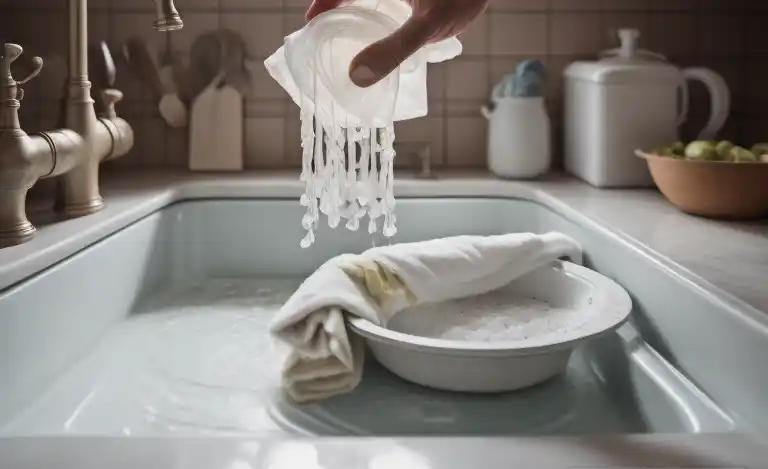
If you’re out of dish soap and don’t want to risk using hand soap, try these homemade cleaning solutions for washing dishes:
Baking Soda
Baking soda is a natural deodorizing abrasive that can cut through grease without leaving chemicals behind. To use it:
- Add 1-2 tablespoons of baking soda to a sink of hot wash water
- Or make a thick baking soda paste by mixing the powder with just enough water to form a spreadable consistency
- Gently scrub dishes and cookware with paste then rinse
- Sanitize with heat or vinegar as usual
However, baking soda may not decrease as thoroughly as formulated dish detergents. You may need extra muscle power scrubbing!
Lemon Juice
Citrus acids help dissolve stuck on foods and leave dishes fresh and smelling.
- Squeeze fresh lemon juice into hot sudsy wash water
- Let dishes soak for 5-10 minutes for juice to penetrate
- Scrub and rinse as normal
Because lemon juice isn’t a formulated surfactant, it may lack the cleaning power of detergents with prolonged use removing some types of residue.
Distilled White Vinegar
Acetic acid makes vinegar a potent yet safe grease cutter free from soap residue.
- Fill sinks/basins with hot water and 1 cup of white vinegar
- Let dishes soak before scrubbing and rinsing
- Can also soak cleaned dishes in a diluted vinegar solution to disinfect
Vinegar works well for non-porous dishes and glassware but Avoid soaking antique, etched, or handpainted ceramicware as vinegar could damage delicate finishes with repeated use.
When to Use Dish Gloves
Washing dishes by hand repeatedly exposes your skin to hot water, grease, food debris, and cleaning chemicals that can dry out and irritate hands.
To prevent cracks, irritation, and even infections:
- Consider wearing rubber dish gloves especially if you’ll be hand washing daily
- Choose gloves thick enough to withstand hot water yet flexible for scrubbing
- Change gloves immediately if a hole develops to avoid direct chemical contact
- Apply moisturizer after removing gloves to replace natural skin oils lost from frequent hand washing
Protecting your hands remains crucial whether you use harsh dish detergents or gentle hand soap to get plates spotless. Investing in waterproof gloves makes the process safer and more comfortable long term.
Storing Hand Soap Safely After Use
Left sitting inside a damp soap dispenser between uses, liquid hand soap has the potential to harbor mold or bacteria defeating its antibacterial purpose. Here are some storage safety tips if reusing hand soap for occasional dish duty:
- Transfer any leftover hand soap from the pump dispenser into an airtight labeled plastic container making sure not to touch the inside edges
- Add 1⁄2 teaspoon bleach per 1 cup soap to help prevent germ growth
- Seal and store away from heat and humidity which can make soap formula separate or degrade faster
- If soap smells strange or you notice changes in consistency, err on the side of caution and throw it away
With proper storage hygiene, hand soap not contaminated by plates or grease could remain serviceable for future hand washing, just not on dishes again!
The Bottom Line
Hopefully, we’ve given you better clarity around whether hand soap makes an acceptable substitute for washing dishes in a pinch or emergency.
To recap the key takeaways:
- Using hand soap once or twice shouldn’t cause harm if dishes are thoroughly rinsed and dried. Stick to fragrance-free liquid hand soap.
- Repeated use isn’t recommended as antibacterial ingredients like triclosan can leave unsafe residues behind not meant for eating surfaces.
- For regular dish cleaning, detergents formulated specifically for kitchens remain best to cut grease, remove bacteria, and leave no soap scum behind. Consider wearing gloves.
- Baking soda, lemon juice, or vinegar make handy homemade cleaning solutions for dishes too.
While it may be tempting to grab whatever sudsy product is handy to scrub plates, don’t make antibacterial liquid hand soaps your go-to for dishes without understanding the risks first.
FAQs: Can You Wash Dishes With Antibacterial Hand Soap?
Should I use antibacterial hand soap on my dishes every day?
No, you should avoid using antibacterial hand soap to wash dishes on a daily or regular basis. Antibacterial ingredients like triclosan are not formulated for food surfaces. Frequent use could lead to buildup of chemicals that are not considered food-safe.
Is hand soap safe for washing dishes?
No hand soap is guaranteed completely safe for dishes, especially with repeated use. Dish soap is specially formulated to be food-safe. Hand soap contains moisturizers and antibacterials meant specifically for the skin and hands. Using hand soap on an emergency basis is generally considered safe, but frequent use is not recommended by cleaning experts.
Does hand soap get rid of bacteria on dishes?
Hand soap does not sanitize dishes as thoroughly as dish soap. While the antibacterial ingredients may kill some germs, hand soap lacks the grease-cutting and disinfecting power of formulations proven to eliminate 99.9% of foodborne illness-causing bacteria. Anyone with autoimmune issues or high-risk health conditions should avoid using hand soap on dishes altogether.
Should I wash my dishes by hand or in the dishwasher?
Both hand washing and dishwashing fully sanitize dishes when using appropriate dish detergent along with hot water and adequate drying time. Hand washing allows targeted scrubbing of stuck-on food but requires more effort. Dishwashers require less work but may miss grease in hard-to-reach areas. For anyone sick or immunocompromised, running dishes through a sanitizing dishwasher cycle remains the safest method.
What kind of soap is the healthiest for hand-washing dishes?
Fragrance-free liquid hand soap or castile soap are gentle enough for occasion emergency use when washing dishes by hand. Sal Suds Naturals Dishwashing Liquid and Dr. Bronner’s are popular plant-based dish soaps that avoid synthetic chemicals found in antibacterial hand soaps. Always check ingredient lists to ensure any soap intended for dishes specifically lists food-safe surfactants.

